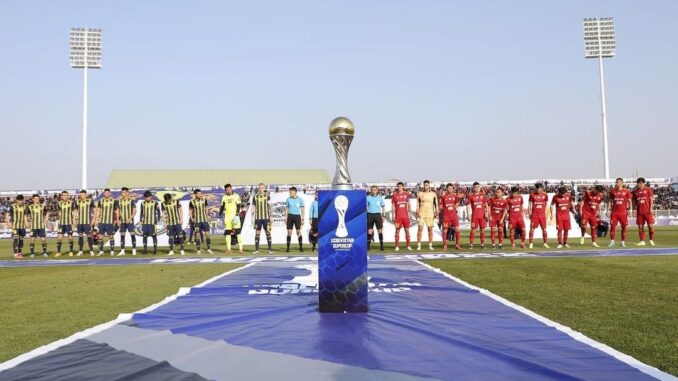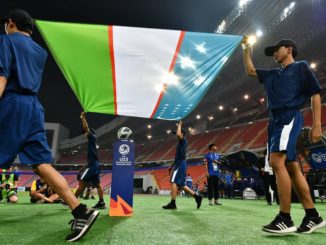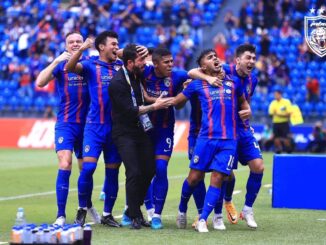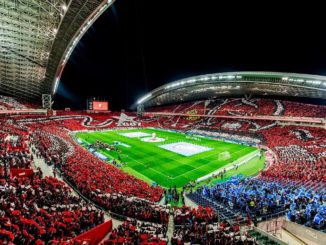
If this weekend’s curtain raiser was anything to go by, Uzbek football looks to have started 2022 in the same fashion as it ended 2021.
Unfortunately, however, 2021 will not live long in the memory; Uzbekistan unexpectantly exited World Cup qualification before the final stage, their sole representative failed to make it through the AFC Champions League group stage, and their domestic championship demonstrably fell back a step in quality following a COVID-impacted transfer market.
To a new start then? 2022, let’s see what you have to offer.
On a bleak winter’s afternoon, league champions Pakhtakor kicked it all off again, grinding their way to a 1-0 victory through a solo Dragon Ceran effort just after the half-time break, sinking domestic cup winners Nasaf Qarshi in Sunday’s Super Cup.
If you felt a sense of deja-vu simmering around the wide open Markaziy Stadium in Kokand, you were not alone. A year on from this exact same fixture, which provided the exact same scoreline, provided by the exact same goal scorer, another episode of Uzbek football Groundhog Day was replaying in all our heads.
While the circumstances felt ever familiar, there is definitely a change in feel around domestic Uzbek football as we head towards the Super League season kick off this Wednesday.
Pakhtakor themselves, who sealed their third successive title with typical ease last term, look a completely different entity to the side that commanded with such attacking verve and vigour, and with eyes on taking on the very best in Asia, only 18 months ago.
This time last year, Pieter Huistra had his first taste of Uzbek football, having succeeded the title winning and well-loved Georgian coach Shota Arveladze last winter.
Arveladze, now at Hull City in the English Championship, oversaw one of the most talented Pakhtakor sides in modern times, clinching back-to-back doubles, whilst guiding his team through to the Champions League knockout stages for the first time in over a decade. A team full of local talent destined for bigger things.
Huistra, navigating through a decimated mid-pandemic transfer wilderness was left holding the baby at the wrong moment. The squad was asset stripped at the peak of their powers, leaving them little time or capacity to jump on adequate replacements.
It’s remarkable then, however workmanlike the style was, that he was able to guide Pakhtakor to their third successive league title late last year. Where they led in their lack of sex appeal, their competitors followed, in one of the most uninspiring league seasons in recent memory.
A year on, another new face in the dugout, Macedonian Slavche Vojneski, dives into the familiar choppy waters.
A raft of personnel changes has again dominated pre-season. At centre back, experienced ever-presences Anzur Ismailov and Egor Krimets have been phased out for the new partnership of Ukrainian Oleksiy Larin, formerly of Istiklol, and Bulgarian Kamen Hadzhiev.
Pakhtakor have similarly sought to replace their attacking creativity, lost over the last two years, in the form of the returning Ikromzhon Alibaev from a stint in Korea, and the ever-wandering Sardor Rashidov, who may actually end up staying for longer this time than the first two months of the season before he gets a better offer from the Middle East…
In attack, they remain ropey. Swiss international-turned inconceivable flop Eren Derdiyok has finally been cut loose, leaving the one-man band of Serbian striker Dragon Ceran to lead the ship alone.
Pakhtakor have felt patched together, at best, for over a year now and as we head into a new season, little looks to have changed. While they got away with it to an extent last season, in an off-year for the entire league, this season looks set to be more challenging.
The chatter for much of pre-season has surrounded one team; Navbahor Namangan.
The club, based out of Namangan in the far east of Uzbekistan, have grown of late to be the prime disrupters of the Uzbek Super League; attracting large, ferocious attendances, playing rough and rousing football that has often startled the very best in the division, namely their growingly heated rivalry with Pakhtakor.
The team encapsulates all that is enticing about a second city underdog looking enviously at the capital, aiming to steal their crown.
A hard-luck narrative that is growing every given season, Navbahor’s persistent complaint that favourable federation and officiating bias is pointed towards Tashkent, in particular at Pakhtakor, wins yet more neutrals to their cause to ambush from the outside.
Their difficulty in the past has surrounded an inability for consistency. It’s a wild ride to support Navbahor, from beating the champions of the league one minute, to a narrow defeat to a relegation threatened outfit the next.
A successful game plan based around passion and commitment is rarely sustainable over the course of a season, hence the need for investment if they are ever to push on to the next level and challenge Uzbekistan’s top order.
An off-season splurge has indeed greeted expectant fans this term. In comes the national team centre back pairing of Rustam Ashurmatov and Egor Krimets, supplemented by the midfield duo of Jovan Djokic from AGMK, and Jamshid Boltaboev after an excellent season with Sogdiana.
The returning jewel of another Pakhtakor graduate, Jasmshid Iskandarov is the clincher though, a signing that started the talk from some in Uzbek football that Navbahor have a realistic chance of upsetting the title balance this term.
The problem, however, as remains the case up and down the league, is a regular goal scorer.
Uzbekistan are slowly realising how a league dependant on overseas frontmen – a trait replicated across Asia, can quickly capitulate if your transfer market is suddenly crippled by a widespread travel ban.
Navbahor were impacted most by this dearth of attacking quality, only managing 23 goals in 26 games last season, slipping to an eventual sixth; no player within the squad accrued more than two goals individually.
While their transfer business has boomed elsewhere, in attack it remains hit and hope once more; the once promising Andrey Sidorov continues his pinball career around Central Asia rocking up in Namangan, while the recruitment of their very own imposing Serb Zoran Marusic, in the guise of Pakhtakor’s Ceran, feels a little copycat, if indeed hopeful of rekindling a striker who’s been out of form for some time.
The building confidence that surrounds former national team coach Samvel Babayan’s side tends to tilt one of two ways; whether you buy this long-awaited surge from a well-supported, but critically under resourced squad as their time to rise to the Uzbek top table, or whether you predict this sudden cash grab in the winter is going to turn sour at the first sign of a struggle, it remains up for debate which way this is going to turn.
A side recovering from their very own boom-and-bust approach is Lokomotiv Tashkent, the last side to wrestle away the title from city rivals Pakhtakor.
They’ve disregarded the big-name approach for the upcoming campaign, in search of sustainability, following a similarly drab mid-table finish last season.
While there is some long-term investment potential in signing young defender Jasur Yakubov from Kokand, the gaping hole again comes in attack, as Temurkhuja Abdukholikov, the leading Uzbek goalscorer last year, moves to Qizilqum, with an optimistic punt on Cameroonian striker Jerome Mpacko-Etame, who performed adequately at best in the Uzbek second tier last season, sought to absorb the significant goalscoring burden.
Last season’s runners up Sogdiana, are hoping to benefit from Lokomotiv’s cloth cutting, bringing in once-prolific, now regressing striker Marat Bikmaev, searching for one last point to prove before retirement.
Sogdiana’s rise was emblematic of a broadly conservative season for all; their defensive resilience which saw them concede on average only a goal every other game, was the main reason behind only three defeats across the entire season, while goalscoring like others remained a headache.
AGMK, a side that held continental champions Al-Hilal to a 2-2 draw in Riyadh last year are attempting to bolster an already sturdy squad, adding Alisher Dzhalilov and Andriy Mishenko from Tajik champions Istiklol, the team that beat them in the same Champions League group stage last year, while veteran Anzur Ismailov from Pakhtakor, plus Khurshid Giyosov and Abdulla Abdullaev from Tashkent rivals Bunyodkor also join.
The 2013 champions Bunyodkor remain treading water following their own scale back on spending over the last decade; the acquisition of Ghanaian winger Francis Narh, who has been playing in Belarus of late is the most excitable of their off-season moves.
The other team of note is Cup specialists Nasaf Qarshi. The AFC Cup runners up from last term will enter the Champions League qualifiers this year alongside Pakhtakor following their domestic cup triumph, and look to persist with the same home grown, possession focussed ideology that has stood them in good stead over the last five years.
Keeping hold of exuberant talent Oybek Bozorov and AFC Cup golden boot winner, 20-year-old Khusayin Norchaev were big coups for coach Ruzykul Berdyev over the winter break, as he continues to persist that his methods are the right way forward.
It’s a similar approach replicated at Super League new boys Olympic. The Uzbek youth-team proxy, who were created last year to supplement the development of the national U20 (2024 U23 age range) side, their progress will be keenly observed this season, as a precursor to this summer’s AFC U23 Asian Cup, hosted in Uzbekistan.
Following a year to forget for Uzbek football, the year ahead, with a home U23 Asian Cup, and their hosting of a senior Asian Cup qualifying group, is well placed to see an improvement in fortunes at national team level.
On the domestic front, however, while Pakhtakor remain a force on paper, there remains a question mark over their progress. With the chasing pack, led by Navbahor, starting to devise a title succession plan, pressure returns to the Cotton Pickers to raise their game and dominate the Super League once more.
Photo: PFL Uzbekistan




